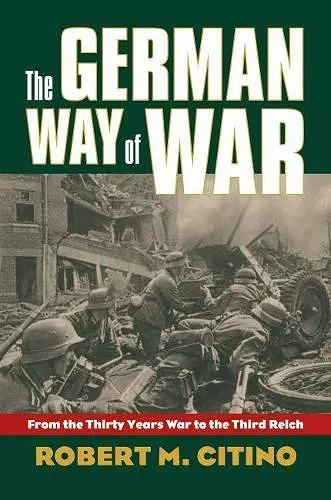The German Way of War
From the Thirty Years War to the Third Reich
Format:Paperback
Publisher:University Press of Kansas
Published:17th Nov '05
Currently unavailable, and unfortunately no date known when it will be back

For Frederick the Great, the prescription for warfare was simple: kurz und vives ("short and lively")—wars that relied upon swift, powerful, and decisive military operations. Robert Citino takes us on a dramatic march through Prussian and German military history to show how that primal theme played out time and time again.
Citino focuses on operational warfare to demonstrate continuity in German military campaigns from the time of Elector Frederick Wilhelm and his great "sleigh-drive" against the Swedes to the age of Adolf Hitler and the blitzkrieg to the gates of Moscow. Along the way, he underscores the role played by the Prussian army in elevating a small, vulnerable state to the ranks of the European powers, describes how nineteenth-century victories over Austria and France made the German army the most respected in Europe, and reviews the lessons learned from the trenches of World War I.
Through this long view, Citino reveals an essential recurrent pattern—characterized by rapid troop movements and surprise attacks, maneuvers to outflank the enemy, and a determination to annihilate the opposition—that made it possible for the Germans to fight armies often larger than their own. He highlights the aggressiveness of Prussian and German commanders—trained simply to find the enemy and keep attacking—and destroys the myth of Auftragstaktik ("flexible command"), replacing it with the independence of subordinate commanders. He also brings new interpretations to well-known operations, such as Moltke's 1866 campaign and the opening campaign in 1914, while introducing readers to less familiar but important battles like Langensalza and the Annaberg.
The German way of war, as Citino shows, was fostered by the development of a widely accepted and deeply embedded military culture that supported and rewarded aggression. His book offers a fresh look at one of the most remarkable, respected, and reviled militaries of the past half millennium and marks another sterling contribution to the history of operational warfare.
Takes the reader on a sweeping march through 300 years of Prussian/German military history and operational thought as Citino explains the 'why' of the German style of waging operational war. He does an exceptional job explaining the operational conduct of the German army during both world wars and how its style of fighting eventually contributed to the defeat of the Third Reich." —Armor
"This book combines colossal scholarship with massively entertaining material. It is all here: the great captains from Frederick the Great to Erich von Manstein, the great theorists and planners from Clausewitz and Moltke to Schlieffen, Seeckt, and Guderian, the pivotal battles that shaped European history, and a humanist's splendid recreation at every turn of the ambiance - sometimes delightful, sometimes odious - of the German army and Central Europe." —Geoffrey Wawro, author of The Franco-Prussian War
"Citino is one of the most insightful historians of operational warfare working today, and his gifts for narrative and puckish myth-busting do not fail him here. This is a fascinating and important book that challenges many conventional ideas and suggests others that are worthy of debate and future study." —Journal of Military History
ISBN: 9780700616244
Dimensions: 228mm x 161mm x 23mm
Weight: 609g
428 pages